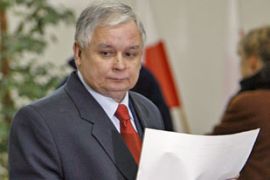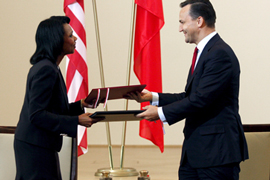US and Poland sign missile deal
Moscow angered by deal to place US interceptor missiles within 200km of Russian territory.

“We have achieved our main goals, which means that our country and the United States will be more secure.”
‘New threats’
Rice told reporters: “This is an agreement that will establish a missile defence site here in Poland that will help us to deal with the new threats of the 21st century, of long range missiles… from countries like Iran or North Korea.”
Russia sees the placing of the missiles in parts of central Europe as a threat to its security.
It says Washington and Warsaw rushed into finalising the deal as a response to its military action in Georgia.
Some Russian politicians and generals have said Poland must be prepared for a preventive attack on the site in the future.
Nato on Tuesday denounced threats against alliance member Poland as “unacceptable”.
It endorsed the missile plan for Europe at its summit in Bucharest in April even though some allies are sceptical about its effectiveness and concerned it could lead to a new arms race.
Moscow view
Neave Barker, reporting for Al Jazeera from Moscow, said that Russia views the intended target of the missile defence shield as not “rogue states” as the US have been insisting over the last 18 months, but Russia instead.
“Remember that throughout the conflict between Russia and Georgia, President Lech Kaczynski of Poland was standing side by side with Georgian President Saakashvili in vocal support of the Georgian leadership.
“The indication from Moscow is that Poland by supporting President Saakesvili was using the war as a pretext to support its own domestic issues, its own desires and its own defences.
“And that’s exactly what Poland has done by deliberately inviting the US to fulfill this contract as quickly as it possibly could,” Barker said.
 |
| Rice, left, and Sikorski say a missile shield will ward off Iran attacks [EPA] |
Philip Coyle, a senior adviser with the Centre for Defence Information in Washington DC, said the Bush administration has been trying for about 18 months to agree the deal, but the timing has turned out to be “most unfortunate from a Russian point of view”.
“The tragedy in all of this confrontation with Russia is that the system that’s proposed for Poland and the Czech Republic is a scarecrow,” he told Al Jazeera.
“It’s not something that Europe can rely on, it is not dependable.
“If Iran had missiles that could reach central Europe, which they don’t yet, this system couldn’t be relied on to defend against them anyway.”
The “commotion and sword-rattling with Russia is for nothing”, Coyle said.
“Some of this may be just a threat, but Russia has shown in just the past week or so it has a formidable military force, so if I were Poland or the Czech Republic, I would be more worried about Russia than I would be about Iran or North Korea.”
‘Threat’ to Russia
The US says the missile system is aimed at protecting it and Europe from future attacks from states such as Iran.
It rejects Moscow’s insistence that it is a threat to Russia.
For Poles, it has a further dimension at a time when Russia’s actions in Georgia have generated alarm throughout Eastern Europe.
They see it as offering a form of protection beyond that of Nato in light of a resurgent Russia to the east.
The two countries spent a year-and-a-half negotiating, and talks recently had stalled on Poland’s demands that the US bolster Polish security with Patriot missiles in exchange for hosting the missile base.
Washington agreed to do so last week, as Poland invoked the Georgia conflict to strengthen its case.
Short-range missiles
The Patriots are meant to protect Poland from short-range missiles from neighbours – such as Russia.
Kaczynski said the shield was purely defensive.
“For that reason, no one who has good intentions toward us and toward the Western world should be afraid of it,” he said.
Poles have been shaken by Russian threats against their nation in punishment for accepting the US site.
A day after Warsaw and Washington reached agreement on the deal last week, a leading Russian general made his country’s strongest warning to date against the system.
“Poland, by deploying [the system] is exposing itself to a strike – 100 per cent,” General Anatoly Nogovitsyn was reported as saying on Friday by the Interfax news agency.